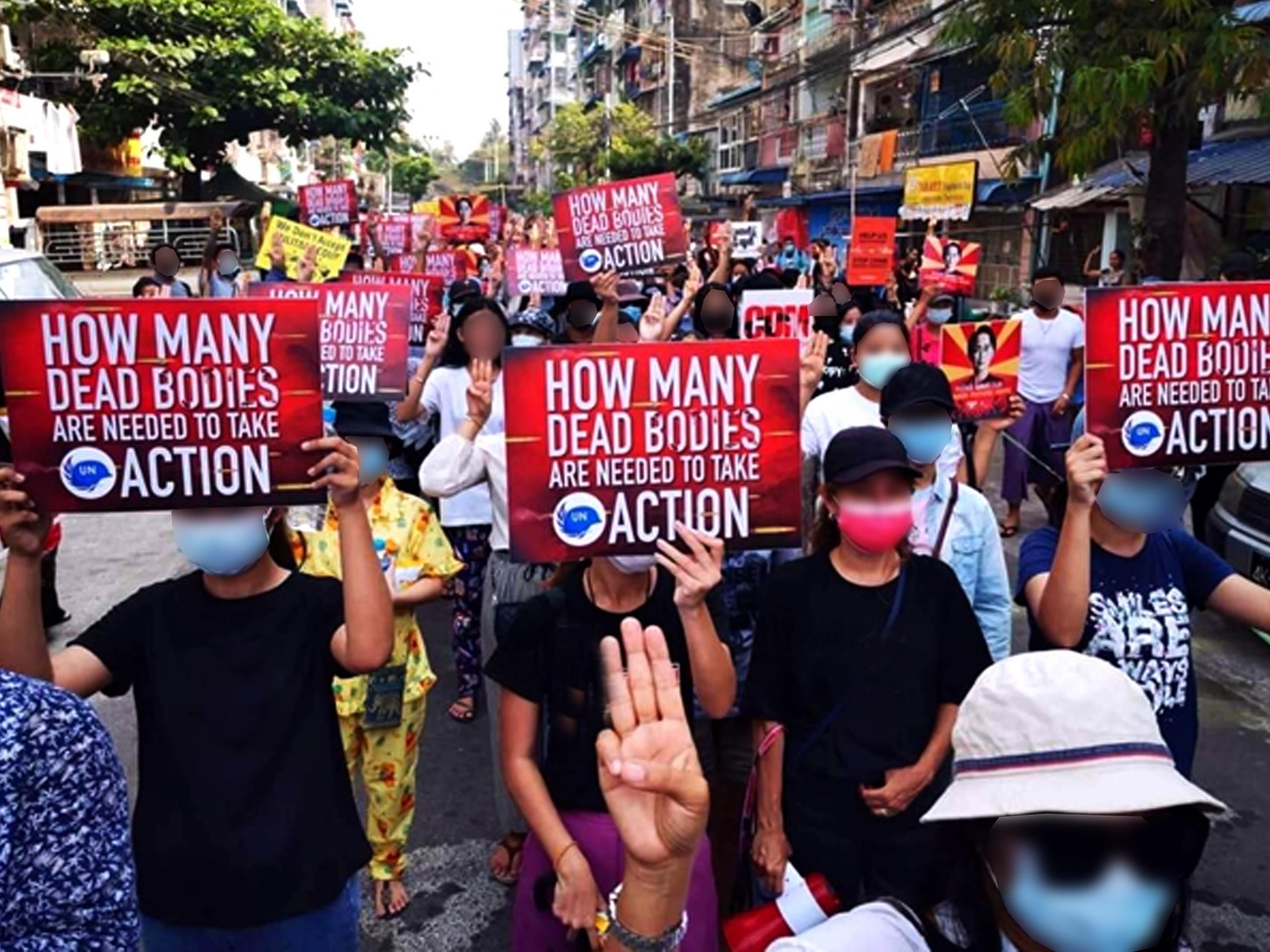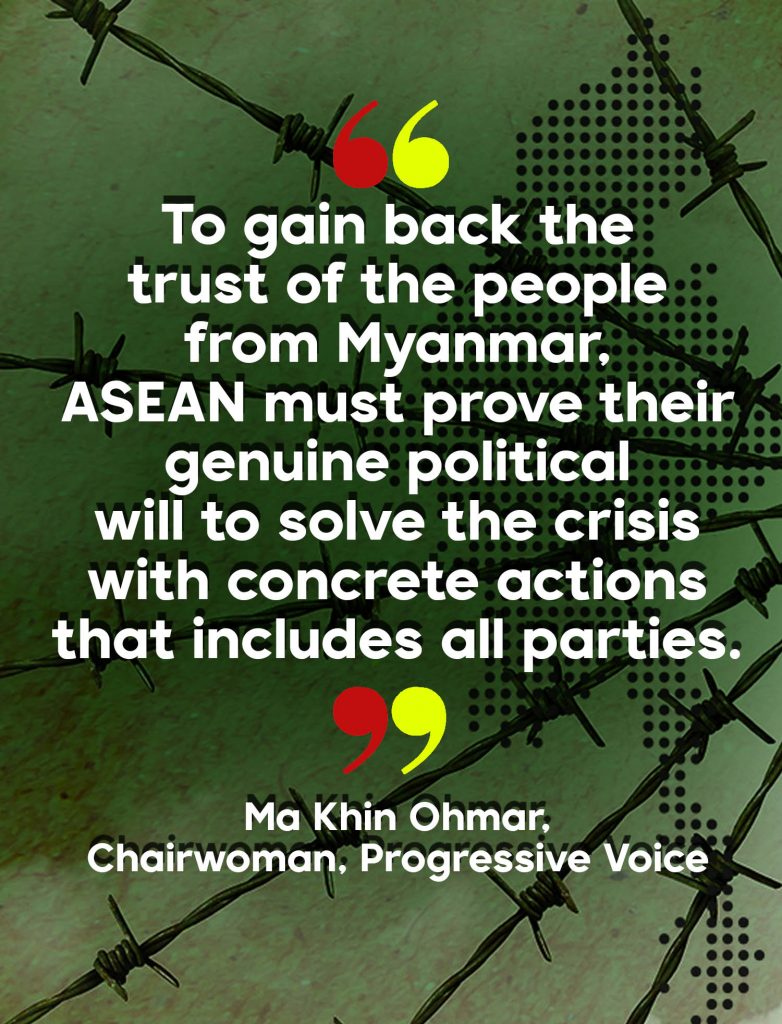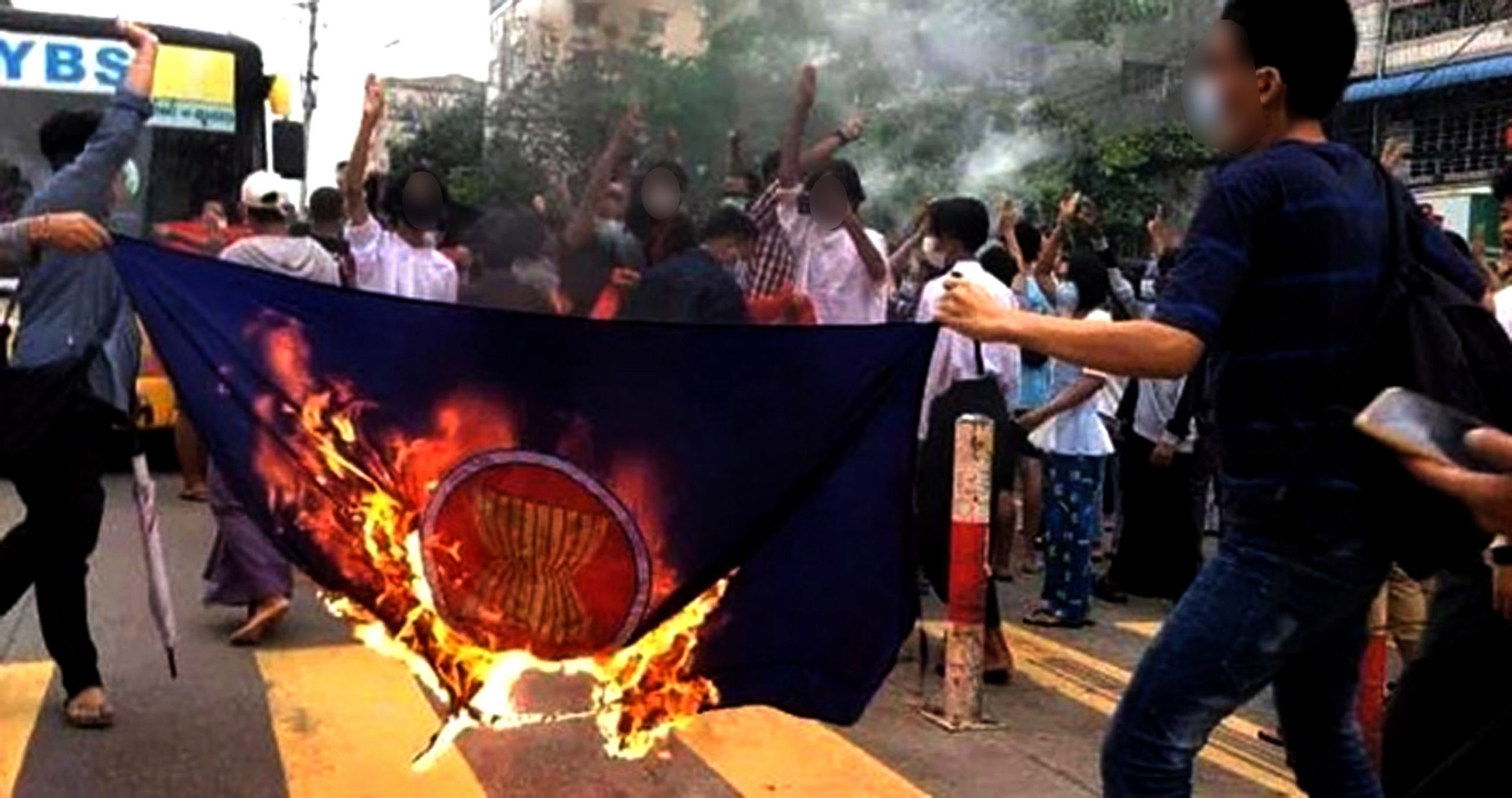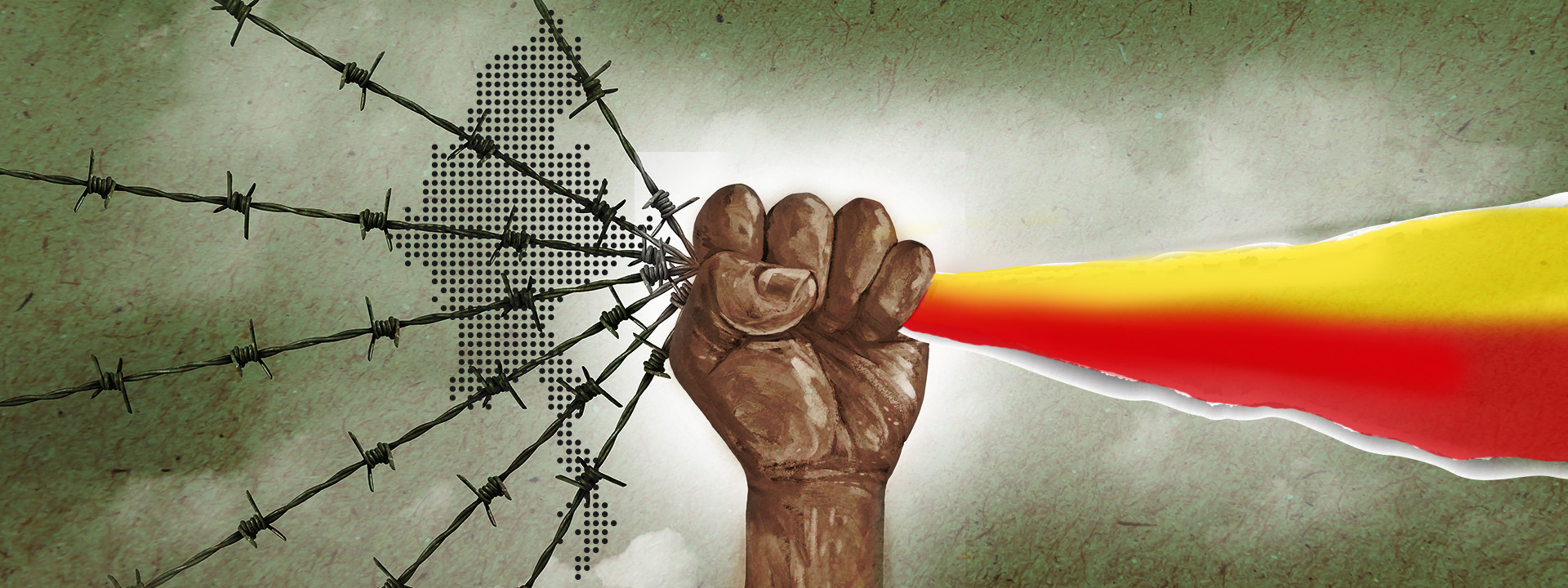The people of Myanmar knew that their domestic options were limited — and shrinking by the minute — soon after the military junta seized power on 1 February 2021. They had to seek outside help posthaste.
Almost immediately, Burmese social media became awash with posts and photos showing the consequences of the coup. Yes, the Tatmadaw, Myanmar’s armed forces, shamelessly undermined the country’s young democracy, but look at how the coup upended the lives of normal, everyday people, often in brutal and extreme ways. The case for the international community to step in was clear as day.
But now, more than half a year later, nothing of substance has taken place, save for a few tepid statements of condemnation and sanctions. Instead, Myanmar has faded away from the public consciousness, pushed to the background by a seemingly unending cycle of terrible news.
As if to reflect national frustration, and desperation for assistance from abroad, a campaign called “How many dead bodies needed for the UN to take action?” went viral on Myanmar’s social media during the early days of the anti-coup resistance movement.
“We thought that the international community would not stand for the military’s inhumane violence against civilians in Myanmar and we hoped they would help us restore our democracy,” laments a 23-year-old university student from Yangon, who asked to withhold their name for security reasons.
“Even though it has been more than six months, we haven’t seen any actions yet. We need actions, not just words.”
But the world seems more focused on the Association of Southeast Asian Nations (ASEAN) and how it plans to deal with the coup.

Not long after the coup, the growing frustration over the international community’s inaction regarding the Tatmadaw’s abuses moved citizens in Myanmar to start a campaign called “How many dead bodies needed for the UN to take action?” Today, more than half a year later, international bodies continue to drag their feet on the matter. (Photo courtesy of a citizen journalist in Myanmar).
On 24 April 2021, the ASEAN secretariat convened a meeting between leaders of member states, where they agreed upon a five-point consensus, offered as a beacon of hope to deescalate the political crisis in Myanmar: cessation of violence; constructive dialogue among all parties concerned; mediation facilitated by a special envoy; humanitarian assistance; and meeting of special envoy and delegation with all parties concerned.
On the surface, this roadmap seems like a solid approach to the fraught situation on the ground in Myanmar, and the international community at large fixated on it. Many international actors, including the UN, the USA, India, the EU, and even China, have considered the five-point consensus as a way to break through the crisis.
But does the five-point consensus reflect the people of Myanmar’s wishes? Was the ASEAN Leader’s Delegation truly representative of the Burmese people? Or did it only serve to legitimize the junta?
‘The more time we take, the more we lose’
On 4 August 2021, Dato Erywan Pehin Yusof, Minister of Foreign Affairs II of Brunei Darussalam, was appointed as the ASEAN’s Special Envoy to Myanmar. This announcement came almost four months since the Association’s meeting in April. As far as the Burmese people are concerned, four boxes in the five-point consensus remain unchecked.
This April meeting had come under strong criticism from the resistance movement and civil society in Myanmar — and for good reason. Invited to the table was Min Aung Hlaing himself, chief of the junta and widely regarded as the most influential force underpinning the coup.
On the other hand, no one from the National Unity Government (NUG), a democratically elected government standing against the junta and representing the civilians, had been asked to participate. In fact, Min Aung Hlaing was the sole representative of Myanmar in the ASEAN meeting, a point that human rights defenders say is the reason behind the Associations’ lukewarm solutions to Myanmar’s crisis.
In a statement, Shamini Darshni Kaliemuthu, Executive Director of FORUM-ASIA, a regional network of human rights-oriented organizations said: “The fact that a perpetrator of state violence and target of international sanctions like Min Aung Hlaing was allowed to negotiate and agree on the consensus, together with other ASEAN Member State Leaders, led to a weak resolution from ASEAN.”

“By giving Ming Aung Hlaing a seat at the table, ASEAN also lends legitimation to the military junta and risk elevating his position as a de facto leader. ASEAN has failed to recognize the peoples’ desire for a meaningful political solution during its Leaders’ Meeting,” she added.
It comes as no surprise, then, that the envoy was met with a similarly strong rebuke. On 6 August, two days after Yusof’s appointment, 413 civil society organizations in Myanmar released a joint letter, stating in no uncertain terms that they reject the ASEAN’s decision to designate him as the envoy.
“The appointment has been made with the sole approval of the military junta, without consultation with the NUG, civil society, and pro-democracy forces including the Civil Disobedience Movement (CDM),” the statement read.
“This is an affront to ASEAN’s own five-point consensus, and will only further embolden the junta, providing the murderous criminals with the political leverage they seek, while continuing to commit grave crimes including war crimes and crimes against humanity.”
The distrust that the people of Myanmar harbor against the ASEAN, and the Special Envoy in particular, is not unfounded. On 11 August, Justice for Myanmar, a human rights advocacy group, released a story that reveals economic ties between the Brunei State and the junta, casting a long shadow of doubt over Yusof’s appointment.
As if it hadn’t already done enough damage to its credibility, the ASEAN Inter-Parliamentary Assembly last August 22 invited junta representatives to its 42nd General Assembly, instead of the democratically elected parliamentarians. Understandably, this drew the ire of many people in Myanmar.
“As the ASEAN itself is questionable, people have no faith on their accomplishments,” said Zack, a young legal professional who asked to remain anonymous for security reasons. “We used to have UN Special Envoys and nothing happened, so we aren’t expecting anything more from this ASEAN Special Envoy as well.”
For their part, the NUG has shown openness to work with Yusof. H.E Mann Win Khaing Than, Prime Minister of the NUG, said that he welcomed the appointment of the Envoy, and that the NUG would cooperate with efforts by the Association. Ethnic armed groups, which have signed a national ceasefire agreement, also looked at the appointment favorably and expressed full support for the international mediation process.
The general public is likewise split in their view of the ASEAN. While the prevailing sentiment is definitely negative, many concede that perhaps working with the Association is the most pragmatic option.
“Though we do not have much trust for them, we need to deal with the ASEAN, as it is a possible means for the international community to extend support and help solve the Myanmar political crisis,” said Min Thiha (not their real name), a representative of Ramanya Federal Democratic Committee, a local democratic network.
But other people have also pointed out that the junta might be using the sheer slowness of the ASEAN as a delaying tactic and as an exit strategy. The Association’s five-point consensus is conspicuously missing a timeframe for implementation, which the junta can see as an opportunity to buy time to attain full control of the country and hold restrained elections.
Others have also lamented that the hyper-focus — of the international community and of some local groups — on the ASEAN could also take away from the strong movement washing over Myanmar’s streets. “The ASEAN agenda is like a barrier for our revolution and if prioritized, it will slow down the Civil Disobedience Movement and the armed resistance against the junta,” said Ko Soe (not their real name), a private educator.
“We cannot accept anyone or anything which disturbs our efforts to bring this junta down. The more time we take, the more we lose.”
Impartial and inclusive
Despite all its faults, the ASEAN does hold some promise to help alleviate the tension in Myanmar — but only if it remains impartial.
“It is understandable for ASEAN to talk with the junta for humanitarian assistance as they still have the de facto power,” said Ko Paing (not their real name), a political science student. “But I wish that they would put more effort to make the assistance as independent as much as possible. If not, the people will be disappointed in the ASEAN again.”
One way for assistance to remain independent is not course it through the ASEAN Coordinating Center for Humanitarian Assistance for disaster management, (AHA Center) or at the very least reform the AHA’s approach.

Following a series of contentious meetings — where the junta was invited but not the NUG — the people of Myanmar have very little love left for the ASEAN, with the civilian movement even holding demonstrations against the Association. The appointment of Dato Erywan Pehin Yusof, ASEAN’s Special Envoy to Myanmar, was likewise met with contempt. (Photo courtesy of a citizen journalist in Myanmar).
“The operations of AHA Center is problematic in tackling the current humanitarian crisis in Myanmar. Alternatively, international aid agencies and donors must provide cross-border aid through local civil society organizations, ethnic health providers, and the COVID-19 Task Force, which was set up by the NUG,” said Ma Khin Ohmar, chairwoman of Progressive Voice, one of the civil society organizations that publicly opposed Yusof’s appointment.
“These local aid providers are experts in their field and have the skills, knowledge, and drive to assist those in dire situations on the ground. They have the full trust of the communities, and now is the time for the donor community to place full trust in them and support them,” she added. The more independent the ASEAN’s humanitarian assistance is, the more reliability the ASEAN gains.
Aside from providing humanitarian assistance, the ASEAN Special Envoy could also help by mediating constructive dialogue, but it needs to make sure that all concerned parties are engaged and respected, and not just the ones that are politically convenient. “Negotiation can be possible under the facilitation of ASEAN if there is inclusion and willing participation of all concerned parties, and if there will be no impunity for those who have committed grave crimes,” Ko Paing said.
Ma Khin Ohmar agreed, adding that this may be the way for ASEAN to reclaim a bit of its credibility. “ASEAN must immediately hold a constructive and inclusive consultation with all relevant parties.”
“To gain back the trust of the people from Myanmar, ASEAN must prove their genuine political will to solve the crisis with concrete actions that includes all parties, and stop violence as a minimum precondition,” she added. “ASEAN must also coordinate with the UN and seek international support in addressing the multiple and compounding crises in Myanmar, because alone, the ASEAN will be unable to mediate effectively, in part due to its non-interference policy.”●
Where stated, names of sources have been changed in the interest of their security, given the fraught situation in Myanmar. Identities of the citizen journalists from whom the photos were taken have been withheld for the same reason.
Jesua Lynn is an independent researcher and peace-education trainer. He has authored and co-authored more than four publications in Myanmar in the fields of human rights, hate speech, youth activism, and peace-building.



















